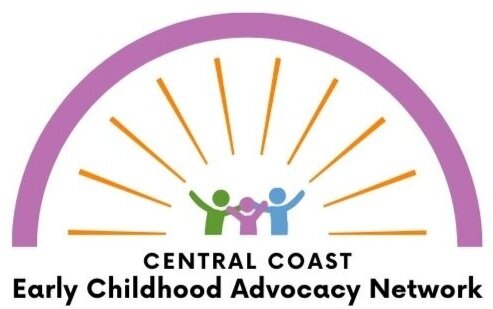
From meeting with our legislative leaders, to engaging community members in the discussion, there are many ways to advocate for change.
Uplifting thriving families.
Children and families need the support of legislators and representatives to support systems that will help them thrive. Parents and advocates from across the Central Coast share what their communities need in order to have happy and healthy families in an annual advocacy video that is shared with our elected officials.
Making our voices heard.
CCECAN continually approaches advocacy through a variety of different avenues. One example, includes gathering advocates across the Central Coast Region - from Monterey, San Benito and Santa Cruz Counties - virtually to practice their advocacy skills and develop this message about what our children and families needed during the challenging time of 2020 to address COVID-19, climate change and racism.
Driving policy change through storytelling.
Zoom meeting with Senator Caballero
Going Hybrid
Since the COVID-19 crisis, we have strived to make meeting participation more accessible. Since March 2020, we have been convening bilingual virtual meetings with local, state and federal legislators to continue to fight for the needs of our community.
Meeting with Assemblymember Rivas
On the Ground
CCECAN members believe making connections, sharing stories and meeting directly with the people who are responsible for creating policy is one of the most effective ways to inform change. Groups of fearless network members have taken these legislative meetings head on and established meaningful and important relationships.
Meeting with Assemblymember Stone
Building Bridges
Developing and maintaining relationships with our state representatives is an important piece of CCECAN’s work. The trust we build between communities and our legislature improves our ability to make meaningful change. This communication is essential to ensure we have someone speaking up for our children at the state level.

Our Policy Goals
Strong Families
Expand access to effective, trauma-informed, and multicultural/multilingual family strengthening programs to optimize child development and reduce the adverse effects of abuse and neglect
Support community hubs for integrated services and crisis supports for children and families.
Support parent engagement on child brain development, including Talk. Read. Sing. Play.
Protect and strengthen the social safety net to build family resiliency and promote self-sufficiency.
Increase access to family-supporting jobs with paid leave, lactation accommodation, fair and flexible scheduling, living wages and benefits, as well as access to adult education.
Quality Early Care & Learning
Increase supply of high-quality early learning programs for children 0–5 and enhancing informal or unfunded care settings.
Embed high-quality standards in all state-funded early learning programs and support state and local efforts to meet them.
Promote affordability of early learning programs, while ensuring fair workforce compensation.
Health & Wellbeing
Ensure all families and caregivers supporting children ages 0–8 have affordable and comprehensive health insurance.
Protect and increase use of essential Medi-Cal services.
Increase coordination across systems of care.
Expand availability of healthcare providers and and access to multicultural/multilingual providers.
Foster healthy lifestyles, including nutrition, physical activity and the built environment.
Effective & Sustainable Systems
Build alternative revenue sources for children’s services.
Improve and integrate county data systems to track and evaluate children’s outcomes.
Mitigate public health risks that widely affect children’s health and wellbeing.













